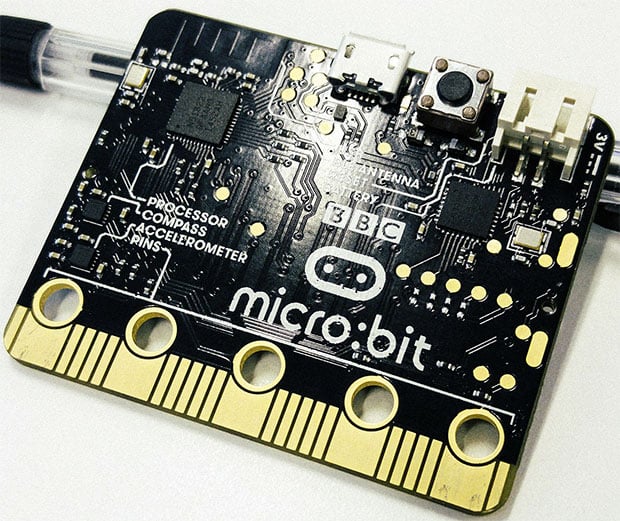BBC Micro Bit Computer To Empower Kid Coders Around The Globe
Depending on how old you are and where you went to school, you might memories of jabbing a potato with nails, wiring it up with copper, and using the seemingly unlikely contraption to illuminate a light bulb. That was high tech stuff back in the day, but it's a different era and today's kids are playing with far cooler toys. One of them is BBC's Micro Bit, a mini PC that's not totally unlike the Raspberry Pi. Having already been used to teach kids in the U.K. how to program, the Micro Bit is headed overseas.
BBC gifted 1 million of the DIY PCs to year 7 (sixth grade) students in the U.K. last year, the the roll out happened later than teachers anticipated. Many of them held onto the device until the next academic year. This led to a later-than-expected start for the Micro Bit, though it's picking up steam. BBC made it commercially available for anyone to purchase for around $19 several months ago. More recently, a new non-profit foundation has taken over the project from BBC, and its chief executive Zach Shelby is spearheading an effort for a wider roll out.

"Our goal is to go out and reach 100 million people with Micro Bit, and by reach I mean affect their lives with the technology," Shelby said. "That means tens of millions of devices... over the next five to 10 years."
The expansion starts with making Micro Bit devices accessible throughout Europe by the end of the year while developing Norwegian and Dutch-language versions of its web coding tools. Then in 2017, the foundation will set its sights on North America and China, both of which will see upgraded hardware launches that will bring more power and new types of sensors to the Micro Bit.
So far the reaction from students has been positive.
"Early research shows that it has helped get girls interested in coding—39 percent of girls who used the Micro Bit said they will definitely do ICT/Computer Science as a subject option in the future compared with just 23 percent before the Micro Bit landed in schools. And we expect this figure to rise as more children get hands on with their devices," BBC stated in a blog post.
Overall, three-quarters of those who've used the Micro Bit say they either like it or love it, while 86 percent said it made computer science more interesting. A whopping 88 percent said the Micro Bit showed them that coding isn't as hard as they thought it would be.
The Micro Bit is a tiny circuit board with 25 programmable LED lights baked in. It's powered by a 32-bit ARM Cortex M0 processor and has a microUSB connector, Bluetooth support, 3-axis accelerometer, built-in compass, a few other bits. Two AA batteries is all that's required to power the device.
BBC gifted 1 million of the DIY PCs to year 7 (sixth grade) students in the U.K. last year, the the roll out happened later than teachers anticipated. Many of them held onto the device until the next academic year. This led to a later-than-expected start for the Micro Bit, though it's picking up steam. BBC made it commercially available for anyone to purchase for around $19 several months ago. More recently, a new non-profit foundation has taken over the project from BBC, and its chief executive Zach Shelby is spearheading an effort for a wider roll out.

"Our goal is to go out and reach 100 million people with Micro Bit, and by reach I mean affect their lives with the technology," Shelby said. "That means tens of millions of devices... over the next five to 10 years."
The expansion starts with making Micro Bit devices accessible throughout Europe by the end of the year while developing Norwegian and Dutch-language versions of its web coding tools. Then in 2017, the foundation will set its sights on North America and China, both of which will see upgraded hardware launches that will bring more power and new types of sensors to the Micro Bit.
So far the reaction from students has been positive.
"Early research shows that it has helped get girls interested in coding—39 percent of girls who used the Micro Bit said they will definitely do ICT/Computer Science as a subject option in the future compared with just 23 percent before the Micro Bit landed in schools. And we expect this figure to rise as more children get hands on with their devices," BBC stated in a blog post.
Overall, three-quarters of those who've used the Micro Bit say they either like it or love it, while 86 percent said it made computer science more interesting. A whopping 88 percent said the Micro Bit showed them that coding isn't as hard as they thought it would be.
The Micro Bit is a tiny circuit board with 25 programmable LED lights baked in. It's powered by a 32-bit ARM Cortex M0 processor and has a microUSB connector, Bluetooth support, 3-axis accelerometer, built-in compass, a few other bits. Two AA batteries is all that's required to power the device.

